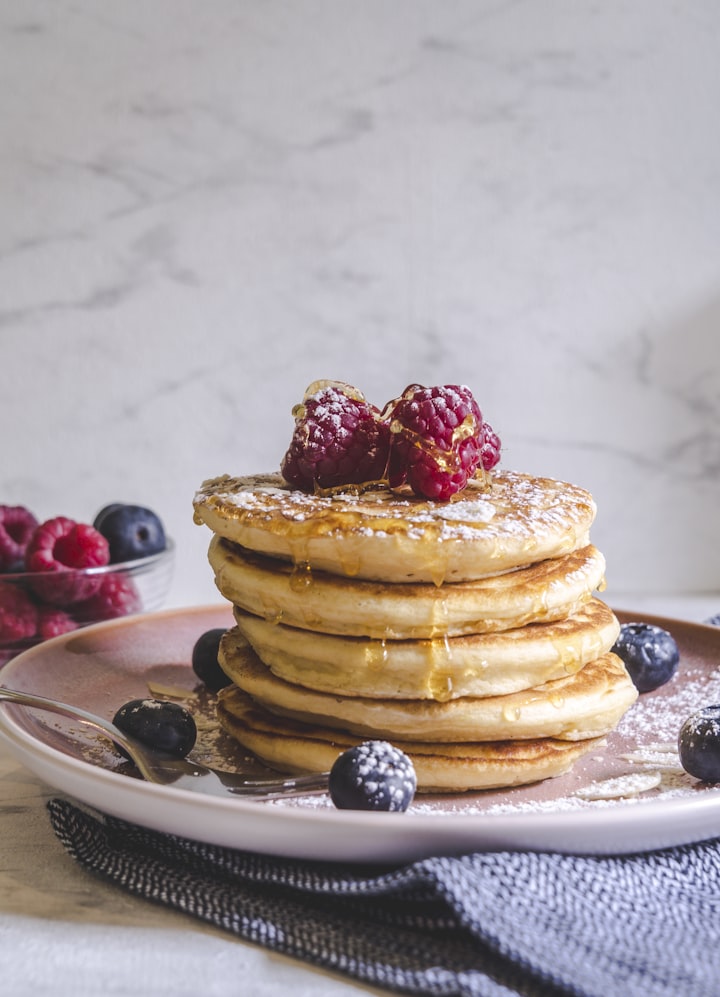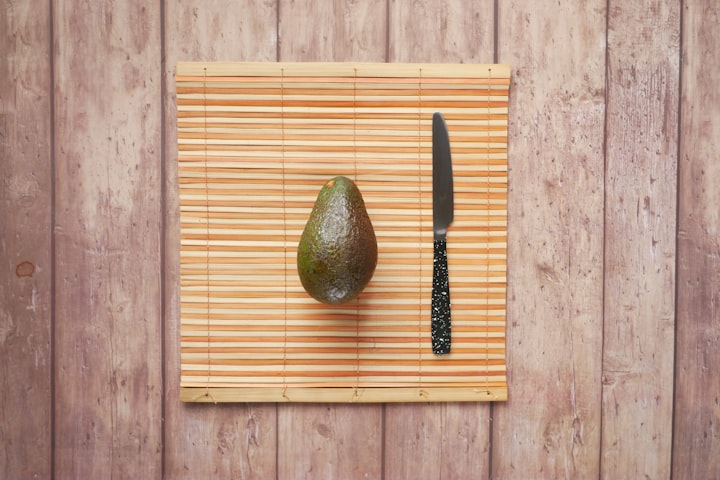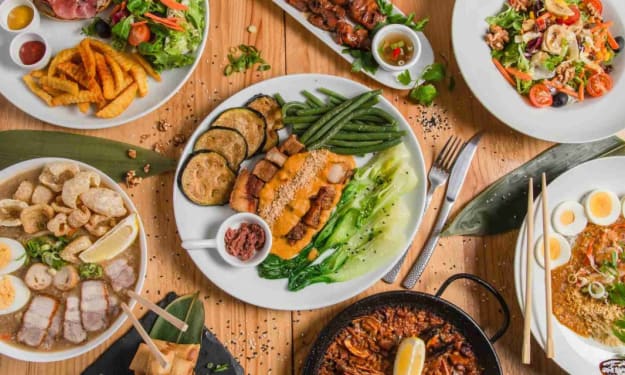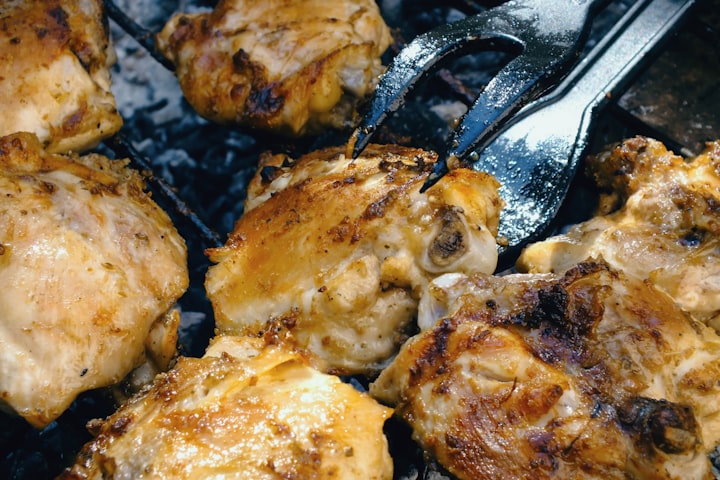The Best Food
What would you eat for the rest of your life?

The best food
The best food should taste amazing, make your life last longer and make you feel good. And if it exists, you should probably eat that food for the rest of your life.
Only food
Let’s start this week's topic with the thought experiment - what would be the only type of food you could eat for the rest of your life? One and only. Do you choose what you like eating, the healthiest meal to keep your life going, or food that just makes sense?
I say pancakes. Plain and simple, they always bring me pleasure. On the plate and in my belly. They are fluffy and crunchy round sponges of joy in the morning and I bet I could live for the rest of my life eating just them. Now, let’s review what would be the outcome of my simple choice. Pancakes are carbohydrate-based food made out of the flower, m*lk, sugar, salt and a couple of simple additions. Fried in the oil they aren’t nutritionally complex food. Pancakes lack most vitamins, fibres, fats and proteins for an average living situation. I run and have a very demanding job. I also like to eat a lot of random things, so pancakes wouldn't fit into my lifestyle. But I enjoy eating them the most. In the long run, besides being a nutritionally poor choice, pancakes would get boring. Unless they are made differently each time, with a variety of toppings and loads of maple syrup, they would get hard to swallow (pun intended). I might as well just eat different food then. At least my choice isn't all that bad. Unlike a stick of butter. On the specter of unhealthy (damaging to the organism) and healthy (benefits the organism) pancakes would be somewhere in the middle. They give energy but not much else.
Imagine eating only a slab of steak for the rest of your life. Besides all the same downfalls pancakes have, poor varied nutrition and being boring after a week, it would also contribute to the increase of the cholesterol that would slowly chip away your lifespan. Yet steak is still next to my favourite food on a health scale as it is a good source of iron, protein and fat, unlike pancakes. Damn you, pancakes! Why can’t you be everything at the same time?
Pros and cons
If you like those foods the pros of pleasure might outweigh the cons. Also living in the western world with well-developed healthcare, fair wages and working hours, social security, absence of wars, presence of a variety of foods (that you would avoid) and supplements, and many other things that prolong your life you would still be in a great place. Around the world, many people simply don't have access to the required amount of calories. In those places, any food/energy source would be good, pancakes or otherwise. To begin with, single food in abundance would provide people with energy and longer life. With more time to focus on things besides food, people would be able to get an education, invest in each other and do many other beneficial things required for a basic living system. People who previously had to spend time doing labour-intensive jobs for survival could then go further and eventually get better food and, in time, all the living conditions of the developed nations.
One food for the rest of life is a bad idea. Some people with mental conditions are eating only one type of food, three times a day, every day, for the rest of their lives. They are happy nevertheless. Without conditional behaviour they benefit more from the nutrition and joy of a varied diet.
Imagine you are an astronaut and right now you are flying far away from Earth and your 3D food printer broke down, what would you hope it would keep making?
There is some evidence to suggest that if you have a source of energy (carbohydrates and fats), a source of protein (even a nutritionally incomplete one) and some basic vitamins you would be good to live a long happy life. On the other side is food that makes you happy despite it being “unhealthy”.
Ponder this:
What would happen if they couldn't eat anything but only one food? What would be the one and only source of nutrition that could provide all the food aspects like cultural development, shareability, variety and pleasure?
Nutrition Vs. Convenience Vs. Joy
The first evidence of the single type of food is from the life of Inuits inhabiting the Arctic regions of Greenland, Canada and Alaska (United States). Under harsh conditions and scarce food sources, they still managed to live, reproduce and eat without the need to move from a cold snow-covered environment to a warmer climate.
Inuits rely on the hunted animals' meats of walrus, birds, whales, seals, bears and fish for about 10 months of the year as it is too cold for plants to grow. For the rest of the year, they mix eating meat with berries, tubers and roots, flowers, and seaweed. Eating mainly raw meat for generations in their experience is a sign of a good diet for human beings though science tends to disagree.
If you were happy to consume raw meat for the rest of your life, would you want everyone to do the same and ignore the variety of plant-based foods out there?
The second piece of evidence is the large population of people living through war conditions, slavery, and other disasters. Here a single food will vary from place to place. What we know is that survivors managed to live on a limited diet of scraps, eating maybe once per day, starving, working 16 hours, hiding, surviving. Surviving? Yes! Being healthy?! Hard to say... though it is easy to speculate they weren’t the overall living conditions were incredibly different to even think about health.
The lives of people in Stalingrad were stagnated during an occupation by German Nazis during the 2nd world war. Thousands of people end up having no access to food and were forced to live on scraps that they had, sometimes eating inedible objects like paper, shoes, rubber, dried-up glue, etc, other times practicing cannibalism. Once again, it is hard to say what exactly were the food sources and how often they were used. But in the condition of immense environmental pressure, it is possible to survive on little to no food.
Third and the last piece is the current living situations in impoverished countries in times of famine or during natural disasters. Regularly having little to no food, they survive. Somehow.
With every example, it becomes clear that it is possible to survive for an extended period of time as long as you have some sort of food and some basic living conditions.
What we didn't talk about is the evidence that in some situations people with a varied and rich food diet suffer from their own choices (and lack of information). Some die from scurvies, seafaring. Others have an incomplete source of protein that leads to death. Many more live in food deserts where a balanced diet is impossible to achieve due to the limited number of nutritionally poor foods, so their health, mind and future prospects are held hostage.
Modern-day solutions
The rest of the world has quick and easy solutions in the form of meal replacements and rations. One of these convenient food sources is HUEL which takes on traditional food with easy, quick and nutritionally complete powders that mixed with water provide an all-you-need food solution. It’s not without the drawback of course. In the case of Huel, you can't have it in the restaurant or enjoy varieties of textures and basic tastes like sweet, sour and salty. Who wants savoury protein powders and smoothies? Or protein, carb, fat and fibre-rich soup? Huel is as much of a solution as it is a complication because removing everything that makes food complex and complicated food loses its meaning. Humans don't eat just for sustenance and don’t accept a source of food they can’t share, talk about and enjoy in the sunrise.
Unless it’s for survival's sake. Look up examples above.
Right now the market is saturated with meal solutions in all forms. Whoever likes to cook buys meal boxes with the pre-weight and carefully chosen ingredients. Following the recipe cards, they make a balanced, tasty meal for two or four, which makes them feel like real chefs. Those who don't like cooking but love good food can get a subscription box with frozen freshly cooked meals. Once again, balanced and tasty, with more convenience to save precious time. For those who don't care about the food all that much and want to care even less, Huel and many other nutritionally complete smoothies, snacks, and formulations are the best bet.
And hey, you can always pick convenient foods that suit your dietary needs and appeal to you by sustainability claims, type of food, ingredients used (wonky veg that would otherwise go to waste) and taste preferences. Do any of those brands work as a complete-complete food solution? How does Huel compare to the pizza or ramen?
What is “the best food”?
Asking questions like “What is the best food?” requires a precise definition of what we are looking at and what the terms are. Starting with what “the best” means. Is it the best for the health or the taste? Because those are the most common claims on food, followed by the dietary needs and preferences, the cost-to-volume ratio, national pride, or cultural contribution and belonging. The best food will also change form when you are hungry and after dessert. But is it even possible to categorize these foods?
If we are talking about taste, it’s subjective, and everyone who has an opinion about the best food has their own preferences. We can find patterns among people who eat food for a living and chemists who analyze human preferences for food and its components. What we know so far is that humans love foods high in umami, salt, sugar and fat. Umami taste naturally comes from glutamates and amino acids broken down by enzymatic reactions, bacterial processes and time. Most of the foods we like and cherish are the products of fermentation. For other foods, we have taste receptors, brain links and evolutionary preference for foods that are salty (tasty/safer), sweet (energy-dense) and fat (even more energy-dense/carriers of the flavours). But does taste matter all that much? And if we look at the taste is it the biology that makes us choose foods that are good for us or can we make a choice that is all about our own developed taste?
The best healthy food is…
On the healthy food spectrum, the best answer would be a variety of whole foods. They contribute to longer, reduced disease development and better overall feeling. Whole foods are natural, minimally processed foods. They are fresh, usually organic and come mostly from plants. In reality “the healthy'' foods category is much more complex because it is hard to say what food is healthy and what’s not because every food is very different. A balanced diet needs balanced consumption of a variety of different foods because none of them, as far as we know, has everything we need. Also amount, condition of the ingredient (fresh/cooked), foods eaten together and even the needs of an individual has different levels of “healthiness” value of those foods. Where athletes would need food high in protein and minerals to recover and build muscles, an elderly person would benefit from simpler food high in vitamins, iron and healthy fats. Saturated fats are considered bad but they are much less harmful to a younger person who can adjust their diet on the go and avoid the effect of high levels of low-density lipoprotein (LDL, "bad" cholesterol) when eaten for prolonged periods of time. Where elderly would have to take their health conditions into account when choosing a balanced diet.
Food is as complex as the people eating it.
At the same time, food is easy. Eat it - stay alive. For how long and how happy you will be are the questions for the next time.
In the Next Episode:
The best nutritionally complete food. Potatoes vs pasta. What could it be-an?
The best “joy” food.
The biggest cultural food influencer.
How important is …? And many more questions
And if you enjoy cookies, please follow, tip and comment for more of the tasty t-reads! ^_^
First published in April-May 2021 on eatxperiment.space by E.K aka TheFoodGuy
About the Creator
The Food Guy
I read about food politics like it's a Harry Potter.
Eating my way through culture and cooking up the future.






Comments
There are no comments for this story
Be the first to respond and start the conversation.